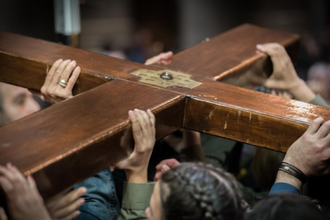New film documents 2000 year history of Christianity in Palestine

Palestinian Christians carry cross in steps of Jesus on Good Friday. Photo by Albin Hiller WCC
"Christianity did not start in Rome, Wittenburg, or Canterbury.... It started in Palestine."
A new film 'Via Dolorosa', shown at the United Nations in Geneva yesterday, documents the 2,000 year Christian presence in Palestine.
Patriarch Theophilos, Patriarch of the Holy City of Jerusalem and All of Palestine and Jordan, said: "We proudly commend this blessed work" of Amira Hanania, the film's director, "as well as the granted auspices of the World Council of Churches and the Permanent Observer Mission of the State of Palestine, as well as all the other international organizations that lent their name and support."
He noted that "The Orthodox Patriarchate of Jerusalem is the oldest continuous religious institution in the Holy Land, but warned that the ancient Christian community in Gaza "has now dwindled to under 600 people."
Patriarch Theophilos said: "Throughout the West Bank and Jerusalem, the economic situation continues to deteriorate because of the lack of pilgrims, the scarcity of jobs, and the unstable security situation in the West Bank and Jerusalem," said Patriarch Theophilos.
Father Ibrahim Faltas, Vicar of the Custody of the Holy Land said: "This documentary is Via Dolorosa for every Christian person in Palestine. Living in Palestine is a part of sorrow. I have been living in Palestine for 36 years.
He said he had witnessed the first and second intifadas and the siege of the Nativity Church. He said the situation now is unparalleled in terms of the challenges and difficulties faced by Christians who have lost faith and hope and "fled the Christian areas in Jerusalem, Bethlehem, and Nazareth."
The Palestinian people rarely get the chance to document their own history, said Greece-based Palestinian Ambassador Hanania, but the film "Via Dolorosa," shows the path of sorrows from the place where Christianity was born and where its presence is now severely threatened.
Before the film was shown, Hanania told diplomats and the public at the UN in Geneva that Via Dolorosa is the first documentary to chronicle the history of Palestinian Christianity through the eyes of its own people.
"It tells their story as they have lived it - free from distortion, free from erasure. It is a living testament to the role of Palestinian Christians in the struggle for justice and a powerful rebuttal to those who seek to erase their identity from the national and international arena."
She said, "In the face of attempts to erase our history and displace our people, we stand here to declare that this land is not just a relic of the past but a living identity that will never be silenced nor erased."
On the platform were also Rev Prof Dr Jerry Pillay, general secretary of the World Council of Churches (WCC), and HE Ibrahim Khraishi, ambassador extraordinary and plenipotentiary for Palestine in Geneva.
Pillay told the gathering, "As the World Council of Churches, we stand with you and with all those who seek justice, peace, and the equal dignity and rights of all people in the Holy Land.
"The WCC has repeatedly called for an immediate and unconditional ceasefire to stop the bloodshed and destruction in Gaza and allow humanitarian aid to reach those in desperate need."
He said the WCC appeals for the recognition of the "equal God-given value and dignity of every human life, Palestinian and Israeli, Muslim, Jewish and Christian. Only on that basis can a just and sustainable peace be built."
"Thus, we also condemned the attack launched against Israel on 7 October," said Pillay.
He said, however, that the tragic events witnessed in Gaza over the last 16 months, and in the context of escalating violence in the West Bank, represent the opposite of peace - "a rejection and denial of the humanity of the other."
Ambassador Khraishi said: "Our message from Palestine, the land of religion, is a message of peace, and based on the historical national and legal rights of the Palestinian people. No one can drive us out of our land, nor implement any form of forced displacement, or ethnic cleansing or forced migration."
Speaking during the discussion, Palestinian theologian and founder and president of Dar al-Kalima University in Bethlehem, Rev Prof Dr Mitri Raheb, also warned that the Christian presence in Gaza will be eradicated.
"Gaza used to be an important Christian hub in Palestine," he said, noting from their Christianity to another part of the Holy Land.
"Christianity did not start in Rome, Wittenburg, or Canterbury," he said. "It started in Palestine."
Mitri warned about the dangers of Christian Zionism, describing it as an "ideology that is weaponizing the bible for political ends," and noted, "For Israel, it is easier if this is portrayed as a conflict between Jews and Muslims."
But he said, "They (the Christian Zionists) don't care about the Christian people in Palestine," nor about Jews.
He added, "It is time to bring peace to the land where peace was born. Palestine gave Jesus to the World. It is high time to give peace to Palestine."


















